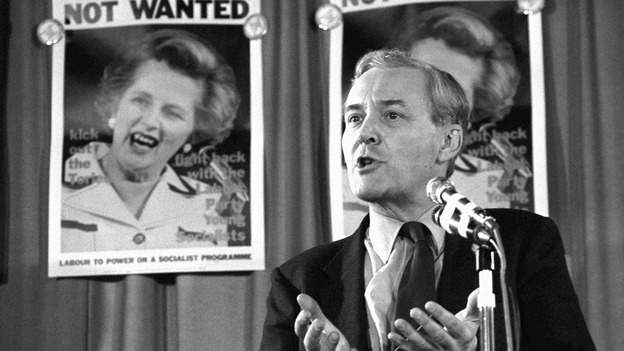Remembering Tony Benn


On March 27th, mourners from across the political spectrum gathered to bid farewell to Tony Benn. In order not to dilute his memory and political audacity into bland commemorative rhetoric, we publish an extract from Leo Panitch and Colin Leys’s The End of Parliamentary Socialism that highlights Tony Benn’s importance for the British Left.
There can be no doubt that Benn’s long and tenacious struggle to avoid being ‘elevated’ to the House of Lords was a major factor in sustaining the radicalism that otherwise ebbs so naturally away from even left-wing Labour MPs once they become schooled in ‘parliamentary paternalism’. His father, a minister in the 1929 and 1945 Labour Governments, had been made a peer and Benn had been acutely aware that this typical example of Labour’s embrace of the archaic British constitutional order would mean, by virtue of his automatic inheritance of this peerage upon his father’s death, that he would be required to give up his seat in the House of Commons. In the course of his fight to avoid this, he had to become a constitutional expert, but he also learned forever to distrust the clap-trap that goes with the defence of ‘tradition’ in British constitutional discourse. When he was indeed excluded from the House of Commons after his father died in 1961, he secured the full involvement of his local party in two successful by-election campaigns and in raising a petition, signed by 10,000 constituents, aimed at mobilising the people of Bristol ‘to wench the Parliamentary system away from its feudal origins and pitchfork it into the twentieth century’. As the best biography of Benn has put it: ‘The successful outcome of his ten-year campaign to remain a commoner… showed that reform only came about through the public bringing unceasing pressure to bear on Parliament. It drove Benn to the conclusion that parliamentary democracy and the rule of law were empty phrases unless rooted in popular democracy, and that Parliament was either an instrument of the people or nothing.’
Benn was, therefore, in several ways well prepared for the explosion of popular politics in the late 1960s. The by-election campaigns in Bristol had stimulated an interest in community politics in the local party and, together with the constituency agent, Herbert Rogers, and a number of local Labour leaders, Benn founded the New Bristol Group which, with over a hundred active members, from 1962 to 1966 published broadsheets and held seminars and meetings on a broad range of local issues from transport to race relations, all aimed at encouraging greater local democracy and a more innovative and active role for local government. The Labour-led Bristol City Council denounced it, but the group saw themselves primarily as a centre for socialist education which would serve as a model for other cities in mobilising ‘the new generation’. To some extent Benn explicitly saw himself following in this respect the example of the anti-colonial African leaders he had got to know in the 1950s when he was a member of a loose grouping of internationalist MPs (including Fenner Brockway, Geoffrey Bing and Ian Mikardo) who saw their role as speaking up for the African independence movements in Parliament and the labour movement. It was characteristic of him that he should have later seen the radicalism of the new activists of the late 1960s and early 1970s in anti-colonial terms, and compared the charges of extremism that were made against them with those that had earlier been levelled at Nehru and Nkrumah. ‘Extremist is the first compliment the Establishment pays you,’ he said in 1973. ‘We are the last of the colonies and the Establishment is trying to stop us breaking away.’